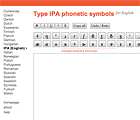 I have just updated my online keyboard for typing English transcriptions with IPA phonetic symbols. Here is a list of recent changes:
I have just updated my online keyboard for typing English transcriptions with IPA phonetic symbols. Here is a list of recent changes:
- New
/t̬/symbol which is increasingly used in English dictionaries to show places where flap t is pronounced in American English. This symbol is typed with the Ctrl+TT shortcut (hold Ctrl, press T twice). /ɪ/and/ʊ/have been replaced with/ɪ/and/ʊ/, following the convention used in the latest edition of the Oxford English Dictionary. Both symbols represent “weak” vowels that can be reduced to/ə/, e.g. in/ˈbju:tɪfʊlnəs/./ɜ/,/ɛ/and/ɝ/are now typed with Ctrl+3 (3 has to be pressed one, two or three times) instead of Ctrl+E. Previously, the user had to press E five or six times to type some of these symbols.- You can superscript any part of text, which is useful for representing optional sounds in words like feel
/fi:əl/. - You can now use Ctrl+I and Ctrl+B on selected text to italicize or bold it.
- There is a new list of recommended IPA fonts available on various platforms.

Hello,
I have been using your typeit program for typing answers to weekly transcription tests given in our introduction to linguistics class at Charles Sturt University in Albury. I also have some students who need to type rather than handwrite the tests.We are wondering : Is there any way to create a specific set for Asutralian English ?
Your “English symbols’ set doesn’t have the right vowels for Australian English, though the consonants are fine.
There are so many varieities on English in the world now, that some flexibility to ‘create’ sets for different variaties might be useful. I have no idea how easy or difficult that might be- so i look forward to your reply.
Felicity Cox and colleagues at Macquairie University modified the vowel symbols for Australian English a couple of years ago …see link here [ http://clas.mq.edu.au/phonetics/phonetics/ausenglish/index.html%5D
You can use the Full IPA keyboard for that purpose. Does that help?